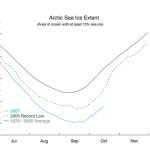“Carbon target is a guaranteed catastrophe”
This was the headline on the front page of The Guardian today.
“If you leave us at 450ppm for long enough it will probably melt all the ice – that’s a sea rise of 75 metres. What we have found is that the target we have all been aiming for is a disaster – a guaranteed disaster,” Hansen told the Guardian.
It’s fascinating watching the public-facing language around the climate change issue morph into something that is accurate, even though most of the people I know in the scientific community have felt it for a very long time – they’ve also felt that overstating the issue would be alarmist, or that they wouldn’t be taken seriously.
Even though we all have the greatest access to mass communication in the history of human-kind, we’ve also systematically undermined and crippled our ability to communicate. We’ve turned everyone into broadcasters.
“He … was himself one of the architects of a 450ppm target. But he told the Guardian: “I realise that was too high.”
The fundamental reason for his reassessment was what he calls “slow feedback” mechanisms which are only now becoming fully understood. They amplify the rise in temperature caused by increasing the concentration of greenhouse gases. Ice and snow reflect sunlight but when they melt, they leave exposed ground which absorbs more heat.
As ice sheets recede, the warming effect is compounded. Satellite technology available over the past three years has shown that the ice sheets are melting much faster than expected, with Greenland and west Antarctica both losing mass.”
I think we all knew this was coming. The scientific method moves slowly, and for good reason, but we already know we are exploiting our resources faster than they can recover. We’ve know this for a very long time – certainly more than my lifetime.
Given what’s at stake, why are we so afraid of communication?
I was impressed with Defra when they asked us to make a minor amendment to the name of AMEE. Originally we’d called AMEE the “Avoiding Mass Extinction Engine”, partly to bring a little bit of a wry smile to everyone we dealt with.
When Defra hired us, however, they took this a little more seriously and, after some considerable deliberation asked if we could amend it to the “Avoiding Mass Extinctions Engine”.
This was impressive government intervention on several counts – firstly they asked very politely if we wouldn’t mind changing the name even though it was our project. Secondly, as they felt that “Extinction” might lead to mass panic, “Extinctions” was a little, well, softer. And finally, they were right, they based their amendment on facts – it’s not going to be one big extinction event – like a meteor – but a build up to potentially many extinction events.
Doesn’t that make you feel so much better. When we look back, assuming we can, with our 20:20 hindsight and question how we’d created a global society where broadcasting is primary and listening is secondary, I wonder what we’ll build to avoid it “next time”.



